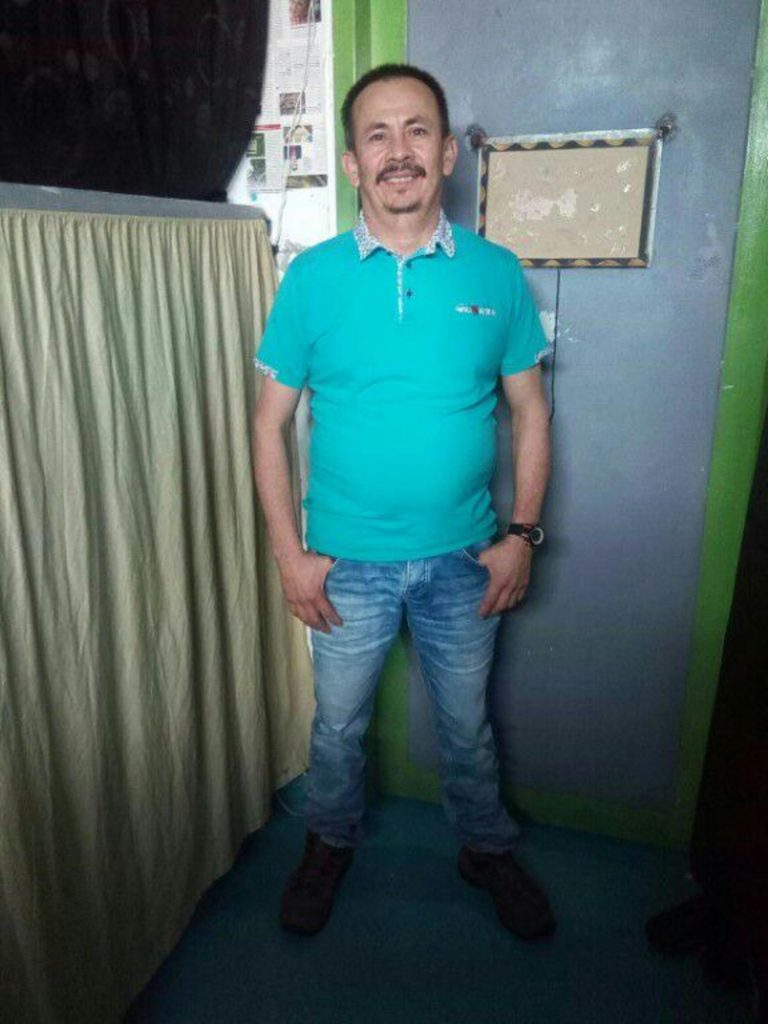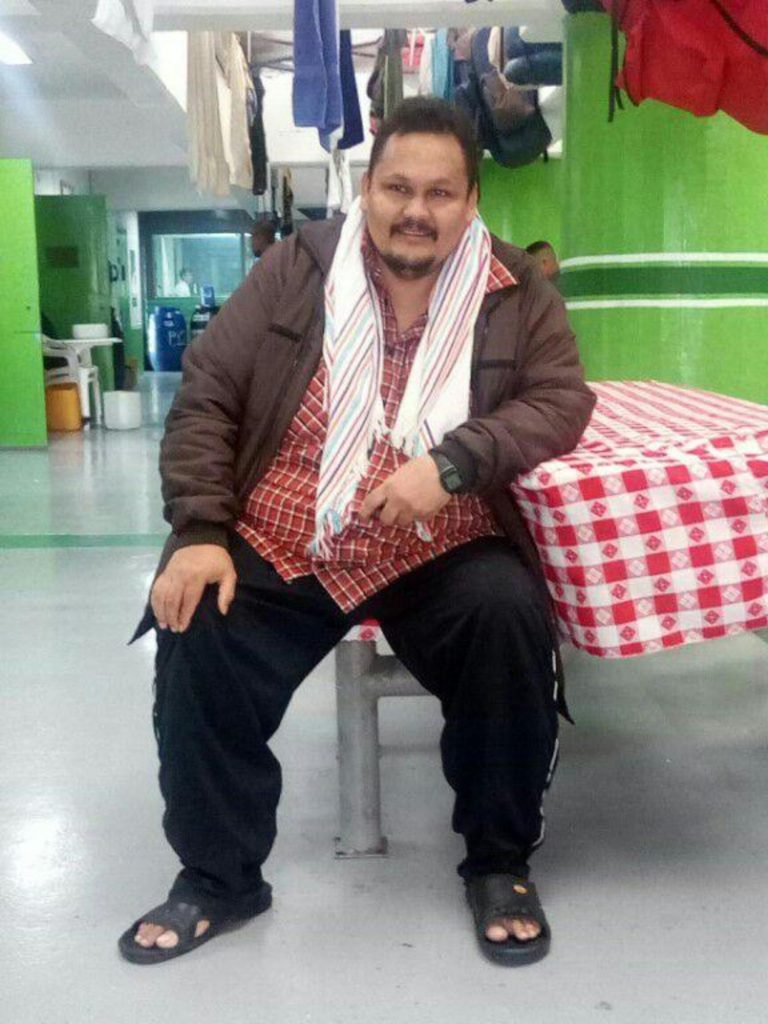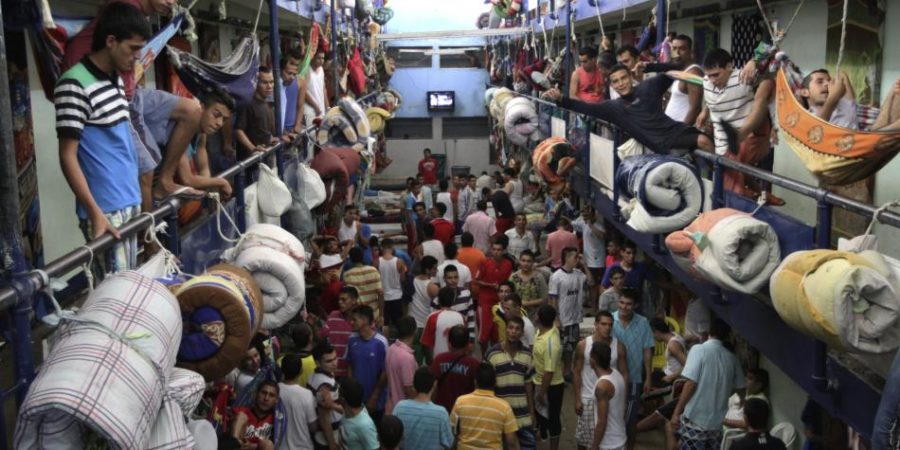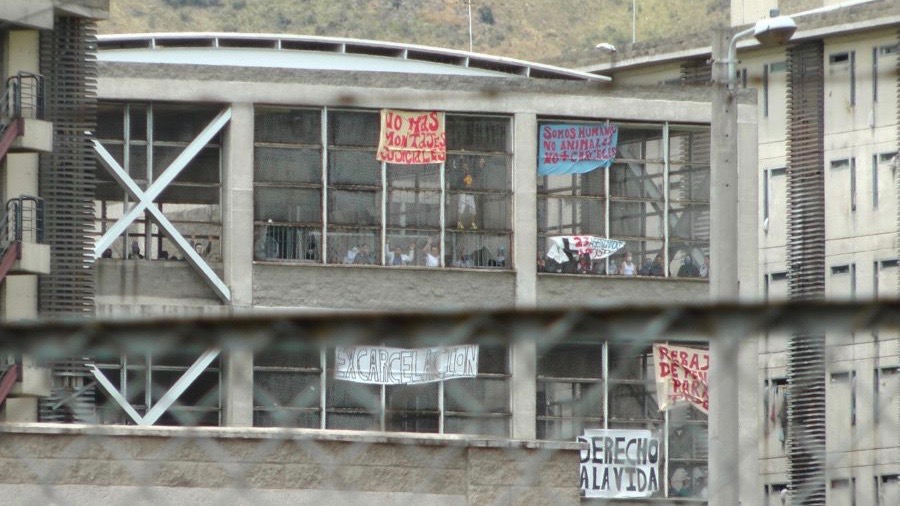From the cold concrete cells of a maximum security pavilion in Bogotá, two Colombian social leaders discuss the demands and historical struggles of the home, the Arauca department, and about their detention and transfer to this prison over 600km away from their homes.
The prisoners of La Picota prison complex in Bogotá have participated in a variety of protest actions due to the risk associated with the arrival of coronavirus. The actions have included cacerolazos, hunger strikes, messages to the public opinion.
Their demands have been synthesized in a 5-point release, but they can be summarized into one: to be treated as any other human being in the times of COVID-19. They request protective materials, antibacterial gels, disinfection measures, care and medical assistance; but also an administration that shows sensitivity towards their struggles and fears, and that, in these times of crisis, shows willingness to sit down and talk with prisoners to find a solution. They don’t forget that, on March 21, during protests in more than 24 penitentiary centers in the country which aimed to highlight these necessities, 23 people deprived of liberty were murdered and 83 were injured in the Modelo prison in Bogotá, after the guards opened fire with the excuse of a supposed mass jailbreak.
José Vicente Murillo and Jorge Enrique Niño are among these prisoners. Their history together begins much earlier in Saravena, in the Arauca department, on the border with Venezuela, in October last year. In order to understand their stories, we have to go back many decades, to the times when the lands where they live, a land called the Llanos de Sarare (part of the vast and mountainous Latin American landscape) were tamed by inhabitants with hats and ponchos in the face of the absolute abandonment of this territory by the Colombian state.
Only by engaging with this historical perspective can we see a place constructed by and for the people, on the distant border of two states (Colombia and Venezuela) which were incapable of meeting the needs of the people of this territory due to poor logistics and a lack of interest. Many people undergoing political persecution in Bogotá ended up fleeing to this territory, searching for new opportunities, but the political and armed opposition also came: first, the liberal guerrillas in the 1950s; then the insurgencies of both the former Revolutionary Armed Forces of Colombia -FARC- and the National Liberation Army -ELN-. The Sarare region was built thanks to a communal effort of its inhabitants. Schools, hospitals, roads, water and waste management companies were all developed by its inhabitants.
When the Colombian state arrived decades later (in the seventies) due to the discovery of oil reserves, it chose a strategy of fear and militarized the area in order to be able to carry out the extraction of crude oil with minimal social investment, accusing everyone in the area of belonging to guerrilla groups. Rather than negotiating with those who had made their lives in this territory and trying to heal old geographical and political quarrels, the state decided to militarily occupy the area and leave the region’s socio-economic development up to the oil companies.
Jorge Niño: I suffer persecution from the state and from oil companies, for being a social leader in the Bancas neighborhood in Arauquita. We have had some problems with the state oil company Ecopetrol and with one of its subsidiaries, the Cenit company, to which they transferred their exploitation contract. This was done as a way to lower workers’ wages and to stop paying the royalties that Ecopetrol paid to the communities that are on the path of the pipeline and where the extraction fields are.
According to the Colombian State, Ecopetrol must mitigate the social and ecological damage of its activities in the communities. They have to build some schools, hospitals and roads but none of this has happened. You won’t see a little school with an Ecopetrol plaque, and the roads are about as bad as you can imagine. Oil from Arauca does not provide a change for the better in our Department. We have been completely abandoned. That is why we have protested. But the only response to our demands for these rights has been increased pressure from the public force, which had already militarized the entire Caño Limón-Cobeñas pipeline. We have had good, regular, and bad experiences with the military. There have been many cases of fellow farmers being murdered, and we don’t understand these acts because when the military come to our houses, we give them water, food, shade, but they kick us down, they label us as guerrillas. We do not understand why the military live with us 24 hours a day and investigate what we are doing, where we are going. The violence really arrived in this department with the oil companies.

This is part of the historical inheritance of the Sarare region, in the Department of Arauca. José Vicente Murillo and Jorge Enrique Niño were not oblivious to a dialectic of struggle and demands as the only way to obtain the most fundamental rights. Within this context, arbitrary arrests have been a constant in the actions of the Colombian State against social demands.
The campaign of repression became so intense that in the 2008 report of the Working Group on Arbitrary Detention of the United Nations Organization, released after a visit to the Department of Arauca, the body announced that “we can observe a practice of mass arrests and the absence of solid evidence to proceed with the captures, particularly when the only indications leading to detention are the accusations of members of marginal groups who reinserted into society. The Group recommends that the Government should eradicate the practice of mass arrest and administrative preventive detention.” Murillo expresses a similar sentiment.
José Vicente Murillo: We must understand that the country’s prison regime is obsolete insofar as, on the one hand, it is insufficient to serve the current prison population; but on the other hand, the policy of the treatment of crime only seeks to put people in jail for any kind of bullshit. Added to this the judicial system is extremely slow and the normal thing is that after the arrests, after three or four years, people are released. either due to the prescription of their crimes or as a result of their innocence. We know, without a shadow of a doubt, that this is a way of persecuting social leaders, which responds to the ideology of the prevailing economic model.
There is a long tradition of Social Construction in Sarare. Like the rest of the country, peasants organize themselves in the Community Action Boards and productive cooperatives. The city of Saravena even has a community business that manages public services, including garbage collection, sanitation and water purification, and recycling and composting of solid waste. Murillo was arrested precisely in the middle of a meeting where the peasant community was preparing a plan for the production of organic fertilizers, while Jorge was detained on his own farm, in front of his family.
José Vicente Murillo: For the last two years we have been working on a process of building organic fertilizers, as a response and alternative to all the contamination that agrochemicals have caused in nature and in human beings. In accordance with our legacy of defending life, we have worked on the creating an organic fertilizer plant in order to provide opportunities for farmers to gradually make a cultural transition in agricultural production. After a training meeting with Brazilian comrades, I felt a presence following me, and shortly afterwards some vans of the public force, armed with assault weapons, stopped me in the middle of the road.
Jorge Niño: I was on my farm with my family, my wife, my children, a brother-in-law with three young children, a worker and a construction specialist, when the helicopter approached. I must admit that I was afraid and couldn’t think of anything other than running, because I had already been threatened that they would capture me because I demanded certain things from Ecopetrol. I ran about 100 meters and several shots were fired at me from the helicopter. I stopped there because, suddenly, I realized that I owed nothing to anyone. I had no other weapon than the pruning shears. They threw me to the ground, kicked me, told me I was a dog, that they should have killed me. I told them that, if they killed me, they would have only killed another peasant.
The murder of social leaders in Colombia is a constant of the country’s politics. According to the Institute of Studies for Development and Peace, since the signing of the Peace Agreement with the FARC (November 2016) until 2019, 800 social leaders have been murdered in Colombia. For these crimes, only 22 effective convictions have been carried out. In the first three months of this year, 91 social leaders and ex-combatants were killed.
One of the most macabre cases in Colombia’s recent history is known as “false positives.” This is a frequent practice in the armed forces that consists of assassinating civilians and who are then made to pass as guerrilla fighters. This act was commonplace due to the rewards received by the military units that obtained results in the counterinsurgency fight, which is measured by the number of casualties. These perks were usually holidays, money or promotions. The result, according to unofficial calculations, is approximately 10,000 people were extra-judicially murdered by the security forces.
The National Movement of Victims of State Crimes (Movice) denounces that it is a state strategy that also contains the practice of “judicial false positives.” This is when the State imprisons social leaders without solid evidence with the intention of stopping their political activities and generating fear in social movements. They usually arrest leaders and accuse them of belonging to the guerrilla insurgency, keeping them imprisoned for years, without ever holding a trial, or starting the trial without accusatory evidence.
Companies such as ECOPETROL are especially criticized for signing agreements with the Ministry of Defense and the Prosecutor’s Office to help with their financing. The company is presented as the alleged victim in legal proceedings in which its activities were affected and it also contributes large sums of money to those responsible for the investigation against the leaders. This creates an asymmetry in which there is a lack of equality of legal conditions and guarantees.
José Vicente Murillo: Front 2003 to 2006 I had the experience of being persecuted by the apparatus of state terrorism. I was detained for three and a half years during which I was given a “prison tour” in different high-security institutions, and in 18 months I was brought to six different prisons. So I am already familiar with the dynamic, culture and cohabitation in the prisons. I already knew that they do not provide you with a mattress, blanket or anything; and that one’s family has to provide you with everything. The experience depends on how you deal with things. If it is true that we are innocent of what they accuse us of, the Colombian regime has never thought twice about assassinating us in order to silence political opposition. If they have to kill us, they will not hesitate. In that sense here we are alive, other comrades have not had this luck.

Jorge Niño: I have never had so many armed people watching over me. They have deemed me a very dangerous person. In the indictment they accused me of being a guerrilla fighter and member of the ELN, but I am just a regular person from the community. Our Community Action Board has had legal representation since 1975. My crime is having been a community leader and asking for basic things for my community from Ecopetrol. They have never found me with weapons, nor military outfits, nor have I ever blackmailed, or had problems with anyone.
The Colombian prison system suffers from chronic overcrowding that is around 54%. The total system has 80,000 spots, yet there are around 124,000 people in the prison system. The unprecedented use of preventative prison by judges is one of the factors which causes the overcrowding. In October last year, the Supreme Court of Justice Criminal, released sentence STP-142832019 (104983), which reminds judges that this tool, preventative prison, should be used exceptionally. However, the people being held in preventative detention represented 33.5% of the total incarcerated population in 2019 according to numbers of the National Penitentiary and Prison Institute of Colombia (INPEC).
However, in the prisons, in addition to space, basic cleaning products, blankets and in many cases, food, are lacking. These must be provided by the families of the inmates and, as such, become a mechanism of arbitrary punishment for those who ask for better conditions.

José Vicente Murillo: This is an anecdote to understand what this regime is like. Our families sent packages to a comrade and me. The packages were identical, with the same number of items. They should have given us them when they arrived, but it took a while. I bothered them about this package and went to speak to the director of the prison, with the Commander of the guard. Then when the next day of turning in items arrived, my comrade was given the package but mine was sent back. They did not give any reason, just that it was rejected. In this package there was a jacket to protect me from the cold, because I am from a warm place and they sent me to Bogotá (that is extremely cold) without allowing me to bring any warm clothes. It is in these types of things that they take repressive measures against fundamental rights.
Jorge Niño: The truth is that I have learned a lot from the INPEC groups. They arrive at night, and are aggressive. They take you out to a small courtyard that is near the pavilion and they make you take out all your things and they throw everything around. They break things, they mix them up with the things of other prisoners. This makes me worried and scared, because there are some inmates that do not have the best temper and you can offend them with the way you express yourself. It is very stressful because if you speak you’re bad and if you do not speak you’re also bad. You run the risk that the other will get pissed off and knife you, because in many times the good behavior of the other inmates ends and fights start. So all day you are risking your life.
Within this violent reality, the possible infection of COVID-19 has increased tensions to a breaking point. The people deprived of their freedom do not only have to deal with the uncertainty of the situation of their families, with whom they barely have contact with, but also they are conscious of their collective weakness in inhabiting a place with the optimal conditions for the transmission of the virus: high contact with other people and scarce measures of hygiene and protection. The massacre of 23 inmates by the Colombian state on March 21 in the La Modelo prison is not part of a solution but a worsening of said situation. They also do not feel at ease with the measures of Decree 546, recently signed by President Iván Duque, which seeks to transfer 4,000 people from the prisons to house arrest. The number is clearly not enough to solve the problem of overcrowding as the system is 45,000 inmates over capacity.
#SolidaridadEnCuarentena | Organizaciones defensoras de Derechos Humanos entregaron en la cárcel 'La Picota', Bogotá, una donación de 500 tapabocas, jabón líquido y gel antibacterial, para ayudar a evitar la expansión del #covid19 al interior de las cárceles del país pic.twitter.com/42HLdBWMjT
— Colombia Informa (@Col_Informa) April 22, 2020
José Vicente Murillo: In this moment we are faced with the issue of COVID-19, wherein the Government and the penitentiary regime took the measure to declare quarantine in the prisons of the country. A measure that we the inmates support but it should be implemented in a comprehensive way. Which is to say, not only taking away visits for prisoners but also applying other measures that are effective to prevent the spread of the virus. For example, the guards should also quarantine and should not have contact with the outside world. And hygienic measures must be taken so that administrative staff cannot be the transmitters of this disease.
A plan should be established in the health service to respond to situations arising from coronavirus. Amid all of this, the incarcerated population has been conscious of the threat of COVID-19 and has taken measures of self-protection in terms of cleaning and eliminating factors of contamination. But we know that these measures are insufficient. A carceral emergency has been declared, with a set of measures of which the Government is immediately applying the most coercive and repressive for the incarcerated population. But there is not one effective measure for the decongestion of the prisons nor hygienic measures to call for the use of masks or hand sanitizer gel. The measure of Decree 546 is insufficient because it only applies to a small part of the prison population. We know that not even with this pandemic will the Government address the most urgent structural problems facing the prison population.
Jorge Niño: With the situation of the virus, we feel the distance from our families with even more anguish. The communication with them is very challenging with many difficulties. There are some phones of the INPEC that are very expensive. Many times they do not even work, they always listen to your calls, there is no privacy with the family. The surveillance by INPEC is very uncomfortable and violates fundamental rights. This makes me feel unsettled because in prison you cannot have any money and you depend on the support and energy of the family outside. It is hard to survive in a Colombian prison and with coronavirus the people are even more nervous in the pavilions and hallways. Conflicts arise faster. I want to tell the State to revise these injustices committed against me, who knows how many people are in the same situation, just for being leaders, for demanding the rights of the community (in theory with approval of the State itself).
The COVID-19 pandemic poses a stress test on a political, sociological, economic and personal level. It has shown where the seams are broken in a society immersed in the logic of using and throwing away. Many of the measures taken, while necessary, result to be fatal for the collectivities that are most socially punished. The systematic nature of the persecution and assassination of social leaders appears, both in the data of the number of people dead, but also the number of people locked up in preventative detention. It is an incredibly high number for a supposedly exceptional measure and it has functioned to silence the critical voices that work in the towns, Community Action Boards or the neighborhoods.
While the country continues under quarantine, the prisoners continue to be overcrowded, subjected to the anguish of proving that effectively the pandemic is spreading within the prisons with the first infected and dead. The denouncements from over a month ago, anticipating the situation, fell on deaf ears.
The Government has opted for repression and a Decree that allows for a limited number of prisoners to be released that will not alleviate the humanitarian situation. This is because of the exclusions that it considers and measures like the irresponsible transfer of prison between prisons (since the prison of Villavicencio wherein the first focal point of infection was detected), that have caused the propagation of the disease. From the National Carceral Movement they continue to call for solidarity with people deprived of their freedom to respond to the situation and achieve a humanitarian release while there is still time to protect thousands of human beings.
*This article is the first in the series Criminalization and punishment in quarantine, an initiative of different international media projects whose objective is to highlight, amid the current global public health crisis, the realities of those people subjected to forced isolation (penitentiary, psychiatric or of migrant detention). Their exclusion and the way they are forgotten, is increased in these times with the suspension of visits. What is the situation in different countries and the response of the governments? In these days of quarantine, the confinement of societies can be a bridge of solidarity towards people deprived of their liberty? This series of reports is meant to share the realities of the establishments of confinement in times of pandemic.
**Mario de los Santos is a writer and chemist. He is a collaborator of Colombia Informa from the Spanish state.





